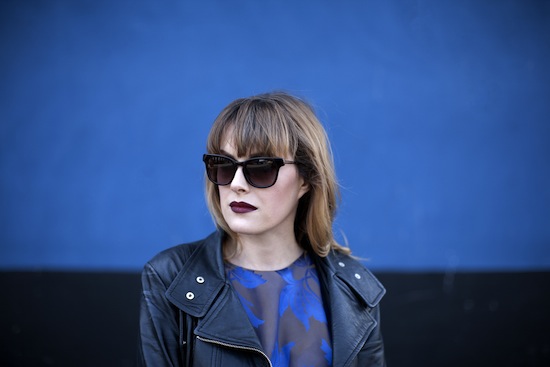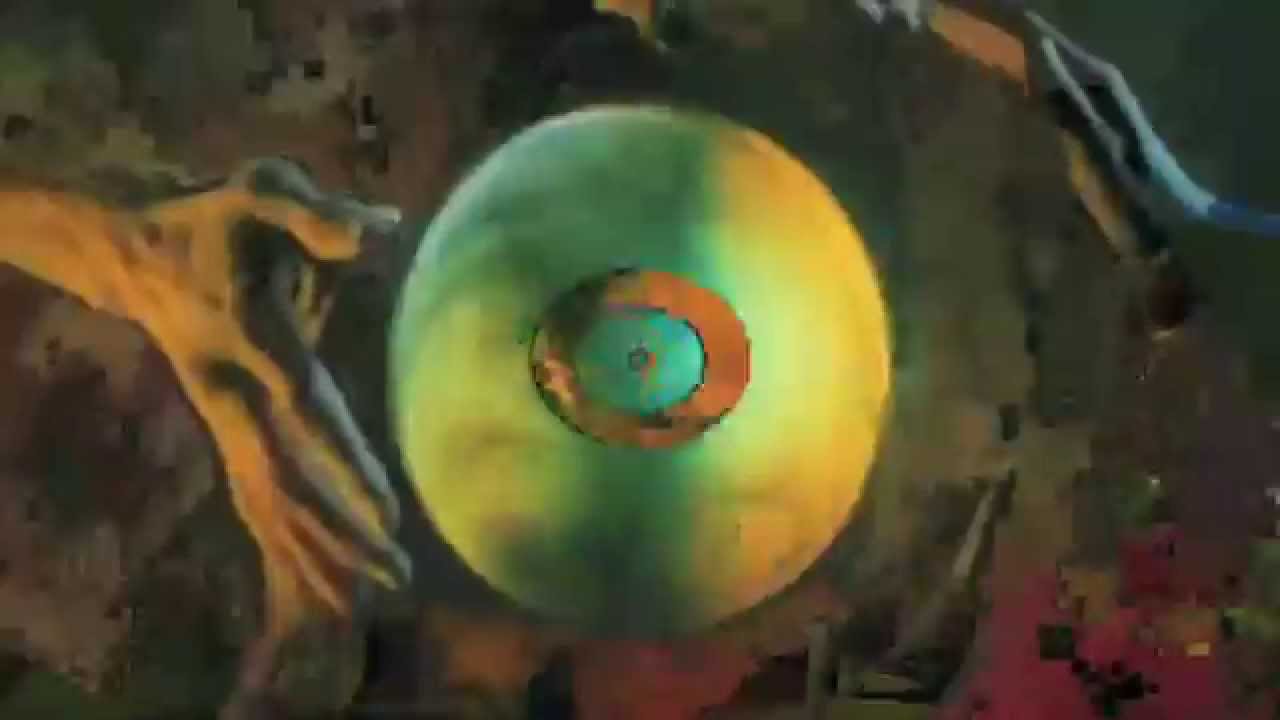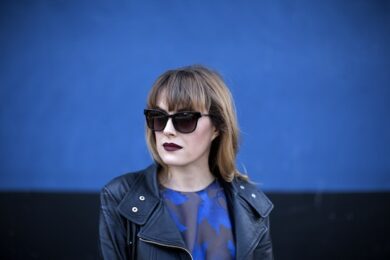It’s 10pm, August 6, 2014 and I’m stood in the middle of a dark field in west Wales. It’s been a long day; I woke up at 5:15am and left my lodgings in London to catch the train to Cardiff, renting a car and driving on the opposite side of the road for the very first time. With traffic and a wrong turn it takes nearly four hours to get to my Airbnb in Cross Hands. Hawkwind’s Nik Turner has invited me out to visit ancient stone sites, and that’s the plan for tomorrow, but tonight I’m heading to the The National Eisteddfod of Wales in Llanelli. It’s another hour on the road to the festival’s Maes B music event and, once there, I hike the mile plus to grab a nice vegan meal at No Bones Jones in the main area. It’s a lovely walk; the beauty of the almost full moon beginning to reflect its light along the coastal path. And now I’m back in front of the stage, exhausted to the point where everything’s surreal. All around me teenagers are getting drunk for the very first time and I’m the oldest person by 20 years every which way I look. But music is a mysterious mistress and one never knows where she will bestow her charms. Little do I realise I’m about to be treated to one of the best gigs I’ve seen in years.
Gwenno takes the stage, an all-black outfit in marked contrast to the polka dots she wears with The Pipettes, who she’s been a member of since 2005. The only female act in this whole week’s line-up, it’s just her and a table full of electronics. She spends a minute or so conjuring space noise, calling forth the elements she’ll be commanding throughout her set, and thus the magic begins.
I have been eagerly awaiting the new material, sung entirely in Welsh and Cornish. The set is dark, shadowy, and yet joyous. Especially so on ‘Patriarchaeth’ (‘Patriarchy’), its "ooo"s markedly POP in all its transcendent glory. Don’t be fooled by its major key sheen, as Gwenno points out, it’s "electro-pop feminism, and straight to the point as well". The chorus is a call to arms – "Patriarchy, and your soul is under siege". This and ‘Fratolish Hiang Perpeshki’, "a song to dance to at the end of the world", stand out immediately as forces to be reckoned with. Despite not being able to understand a word (Gwenno translates it for me later), meaning is apparent on a deeper level. ‘Fratolisch…’ is delivered with a power and intensity that we need more of in pop music. It’s a complete evocation of another world, in this case the House Of The Twilight from Owain Owain’s 1976 sci-fi novel that inspired and lends its name to Gwenno’s new record, Y Dydd Olaf. The title track also soars live (a more laid back version graces the album). But before I hear any of these again, the only song I recognise is last year’s single ‘Chwlydro’ (‘Revolution’). And what a fucking groovy tune it is. The pulsing bassline, its whole confident swagger. The message: "Don’t forget that your heart is in the revolution".
Talking about the track, Gwenno explains: "Political song has always been an important part of pop music in Wales. Music is more powerful than we’re allowed to believe at the moment. It’s been so commodified that people have lost sight of this, its been turned into something that’s quite a solitary experience and I don’t think that’s the true power of music. As much as listening to something on your own is very beautiful and introspective, music is a really powerful tool to bring people together and create new ideas, new feelings and new worlds."
"’Chwyldro’ means ‘revolution’ and a lot of the song is about modern technology and this weird world we’re constructing. The Cardiff that I grew up in doesn’t exist anymore and that’s common in post-industrial cities where things get knocked down and then something else gets built in its place. This idea that we’re putting all of our lives into this new technology while everything around us is crumbling. The contrast between the new world and the old world and how revolutionary that can be."
"In the song I reference a very famous lecture that Saunders Lewis gave in 1962 called ‘Tynged yr Iaith’ which means ‘The Fate Of The Language’. One of the big things was that only through revolutionary methods can you change anything. The Welsh language is quite a political thing even when it isn’t. Don’t get me wrong, there are a lot of musicians who sing in Welsh who would say they’re not political at all and I would agree with them. But for me, what inspires me about the language is that it still exists, which makes it quite political, because the powers that be have tried to get rid of it."
And the album was inspired by an obscure Welsh sci-fi novel?
Gwenno: I read Owain Owain’s Y Dydd Olaf (The Last Day), an amazing book which very much inspired the album. I found it on a brilliant blog called Babylon Wales, this guy would find really strange things from Wales. When I came back to Cardiff, Wales was in the midst of a Celtic folk revival, which felt quite grounded in the Victorian era. Everything was very rustic and in the countryside. So my immediate reaction was to go, "Oh right, so where’s all the science then?" I was looking for books anyway. I had read Brave New World and this is almost like an echo of that. But rather than be about all the top layer of society, it’s about the people on the ground that are getting turned into machines. Everyone is being turned into a robot. It’s written in the form of a diary that the narrator’s writing in Welsh which the machines can’t understand, so he’s able to document it all. And eventually he gets turned into a robot. It’s about how a state dictatorship propaganda machine turns everyone into mush. It’s a really, really clever book. And nobody’s heard of it! My dad told me that at the time there were letters of complaint about the book being written, saying "things like this shouldn’t be written in Welsh". There was a backlash because it was so scientific and not a romantic novel at all.
The author Owain Owain was quite ahead of his time. He predicted the internet in 1969 in Y Cymro, the weekly newspaper in Wales. He was a nuclear scientist originally so the science fiction was written by someone who knows about science. He also founded the magazine for the Welsh Language Society, Tafod y Ddraig (The Tongue Of The Dragon), and sketched their original logo as well. He’s quite an interesting person who I feel hasn’t been celebrated at all.
How do you think non-Welsh speaking people will react to the record?
G: People have rediscovered older pop music, and that’s been a big thing in terms of hearing something familiar that you don’t understand. There’s something really freeing about it ’cause you’re like, "This is something I know, I know all these references". But then you can hear another culture in it that you don’t know much about. And I really liked that idea. It’s familiar but unfamiliar at the same time.
The challenge is that music is enough of an expression that it doesn’t really matter what the words are or what language it’s in. It still surprises me that, considering how many other languages are so widely spoken in the world, that so few others have been part of popular culture, and certainly pop culture. I find it strange that there isn’t more of a melting pot of language within the pop charts. I feel it becomes really two dimensional when everything’s in English. t.A.T.u. did a Russian version of ‘All The Things She Said’ and it was even better than the English version! And you think, "Oh, imagine if that had been number one". It would’ve been far more exciting to have had a Russian number one everywhere.
Besides it being your mother tongue, why do you think the Welsh language is so important?
G: For a start, in a historical sense, it’s one of the oldest living languages in Europe. It obviously comes from Brythonic, the oldest language of Britain. When you’re using a language that old, you’re using words with a depth of history, the history of a people. I find that fascinating. You lose so much when you lose a language. Because it’s my first language, all the literature that I’ve read and all the things that I’ve been inspired by that have been written in Welsh have moved me beyond anything that I’ve experienced in any other language. The culture is so rich and it’s enriching as well. It’s part of an identity. I feel the same way about Cornish. The fact that Cornish exists at all is just incredible as is the work that people are doing down there, it’s such an important part of who people are. In a world where globalisation wants to turn everybody into the same thing, I think that anything that allows you to go to another place or be in another world has got to be celebrated. Each language gives you something different so that’s a good enough reason for you to learn it. You’re always going to discover something that no one can express in any other language. It enriches everybody. It is for everybody as well. I’d love it if everyone in the world spoke Welsh, it’d be great.
So how did the songs come about?
G: I did a lot of field recording initially. I went around and recorded a lot of things on my phone. I really liked the idea of just using everyday sounds, street sounds. Then I chopped them up and created samples out of those and they became the base of a rhythm track. I was really obsessed with the idea that it would start with a sound. Having been a singer in a band, I thought a lot about vocal melodies and chord structures and less about the sound of everything. And I really wanted to get to the bottom of the idea of creating a soundscape before coming up with any sort of song. The songs then grew out of that.
I did a lot of the field recordings in Cardiff Bay. There’s stuff I picked up over the years as well. We were in Berlin, which is a very clichéd place to go and do some recording [laughs]. The Jewish Museum there is the best museum I’ve ever been to, it’s fantastic. Very interactive as a building. There’s a brilliant area where they’ve cut out thousands of metal faces to represent all the people who have ever been killed in wars across the world. And when you walk on it, it makes a really clanky sound. So lots of things like that, which you can then turn into rhythm tracks.
I’ve got this project that I do with Rhys (Edwards, Peski Records), Haydon (Y Pencadlys), Pat Morgan from Datblygu and my dad (Tim Saunders). The group is called Canolfan Hamdden (Leisure Centre). We come together and play instruments randomly and have a sort of musical workout. My dad’s a poet and he then does random words over the music. We play for quite long periods of time, like four or five hours, and it’s all recorded. That’s helped me experiment more. Getting into the ideas and forgetting pop structures for a while is exciting cause I really don’t know what will happen next, what I’ll make next. It’s really opened up opportunities and options. I instinctively want to create pop songs and I think it’s really good to challenge that, otherwise it becomes a habit. You need to push yourself, put yourself in uncomfortable situations rather than stick to your comfort zone. My aim is to be able to be more spontaneous so I keep evolving my live set-up. I’d also like to eliminate pop structures by the next album and come to use less music to make more. What playing solo has reminded me is how much I love electronic music and how much I love dance music. I’d like to move towards something more hypnotic and rhythmic rather than song-based.
We’ve also been doing this radio show called Cam O’r Tywyllwch (‘A Step Away From Darkness’, broadcast live every Thursday between 9-10 pm on 98.7 fm Radio Cardiff; older episodes here) where we’ve been exploring experimental and avant-garde music. It brings another dimension to listening to music where it’s not just about a song and a voice, it’s really about the sound and the atmosphere as well. I think that’s something really important that’s on the album. It’s not just "here’s a bunch of songs", it’s a world.
We were listening to Joe Meek’s I Hear A New World a lot and there’s a little tribute to that at the end of side one called ‘Dawns Y Blaned Dirion’. Y Blaned Dirion (The Meek Planet) is a sci-fi novel written by Islwyn Ffowc Elis about another planet that is a more progressed version of Earth and people build a spaceship and go visit it. Another sci-fi novel chucked in there for good measure [laughs].
And the first song on side two is the second single, the haunting dreamlike ‘Golau Arall’ (‘Another Light’).
G: That’s based on a really old Welsh hymn called ‘Ar Hyd y Nos’. There’s a really beautiful line in it – "the darkness is another light that shows up true beauty". It sounds much better in Welsh. The song is about artists and the artist’s role within society, which is something that gets pushed to the side, something that’s almost hiding in the darkness. It’s a celebration of artists. But also about challenging yourself artistically as well, that need to push yourself to another place.
What do you see the artist’s role in the community as?
G: It’s the culture that makes a city. The culture, the music and the art are all of the things that make a city appealing. Otherwise what is it? Just a bunch of buildings. When these austerity measures came in, certainly a lot of cuts were made in youth projects, music projects and music teaching. There’s a really great arts community in Cardiff. And there are some really wonderful galleries around Wales like Oriel Myrddin and Oriel Mostyn, but I think Wales deserves its own national modern arts gallery. Visual art is really important. Every city needs its graffiti artists and its murals, theatre and carnivals. I felt like the government was trying to take it all away from everybody. And that’s true everywhere. I was just like: "No! You have to celebrate this."
You mentioned Cornish culture as well. Let’s talk about the one Cornish song on the album, ‘Amser’.
G: Amser means ‘time’, and it’s the same word in Welsh. The lyrics are actually a poem my dad wrote years ago. I’ve always spoken Cornish at home, and on and off over the years I’ve gone through my dad’s books and thought, "Oo! That’s a good one" and put it to music. This is about how time is slipping away and how you can’t stop time from moving forward. The verses are, "the trees don’t stop growing, the lake doesn’t stop freezing over, how much time do we have left? How long before we reach the top of the mountain?" It’s just about being conscious of time running out. It symbolised how I felt when I was reading Owain Owain’s book, which represents the emergency of a language and a people potentially disappearing. From my dad’s perspective he’s probably referring to Cornish and to Cornwall, that there’s limited time to save things, save a culture, save a language. And obviously The Last Day is the title of Owain’s book and my album and it’s all about that sense of emergency, that you’ve got to do anything that you feel is precious. I especially believe that about cultures and languages. You’ve got to be really conscious because time is running out. You don’t have forever to make sure that they keep on existing. I felt that even though I hadn’t written the lyrics and that poem had been written a couple of decades ago, it fitted in quite nicely as an ending to what I was trying to express in the album. And I really wanted to include a Cornish song. I’d like to do more music using Cornish words.
Back at the Eisteddfod, Gwenno would end on ‘Amser’, its echoey refrain, "Pez kam bis dhe warthev ann bryn? Pes ehr ry’ niversos dhyn?" ("How many steps until we reach the top of the hill? How many hours have been counted out to us?") ringing out into the enchanted night. As on the album, the track rounds off a set that contains all that vitalness of being, that sense of emergency, to save and savour the important things, and make the most of the precious little time we have.




